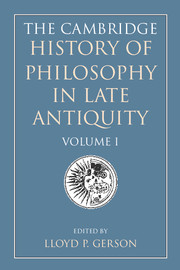Book contents
- Frontmatter
- General introduction
- I Philosophy in the later Roman Empire
- Introduction to Part I
- 1 The late Roman Empire from the Antonines to Constantine
- 2 The transmission of ancient wisdom: texts, doxographies, libraries
- 3 Cicero and the New Academy
- 4 Platonism before Plotinus
- 5 The Second Sophistic
- 6 Numenius of Apamea
- 7 Stoicism
- 8 Peripatetics
- 9 The Chaldaean Oracles
- 10 Gnosticism
- 11 Ptolemy
- 12 Galen
- II The first encounter of Judaism and Christianity with ancient Greek philosophy
- III Plotinus and the new Platonism
- IV Philosophy in the age of Constantine
- V The second encounter of Christianity with ancient Greek philosophy
- Map 1 The Byzantine Empire, c. 500
10 - Gnosticism
from I - Philosophy in the later Roman Empire
Published online by Cambridge University Press: 28 May 2011
- Frontmatter
- General introduction
- I Philosophy in the later Roman Empire
- Introduction to Part I
- 1 The late Roman Empire from the Antonines to Constantine
- 2 The transmission of ancient wisdom: texts, doxographies, libraries
- 3 Cicero and the New Academy
- 4 Platonism before Plotinus
- 5 The Second Sophistic
- 6 Numenius of Apamea
- 7 Stoicism
- 8 Peripatetics
- 9 The Chaldaean Oracles
- 10 Gnosticism
- 11 Ptolemy
- 12 Galen
- II The first encounter of Judaism and Christianity with ancient Greek philosophy
- III Plotinus and the new Platonism
- IV Philosophy in the age of Constantine
- V The second encounter of Christianity with ancient Greek philosophy
- Map 1 The Byzantine Empire, c. 500
Summary
INTRODUCTION
To the question ‘What is Gnosticism?’ there is no simple answer. The term itself is modern, coined by one Henry More in the seventeenth century, in a work on the biblical book of Revelation, where it is applied to the heresy of Thyatira (Rev. 2.18–29). The ancient term ‘gnostics’ (gnōstikoi) is attested in the Christian heresiological literature, though it is difficult to ascertain exactly to whom this label is applied. The earliest instance of the adjective gnōstikos is in Plato (Statesman 258e), where he distinguishes between the practical and theoretical sciences, both being types of knowledge (gnōsis). Irenaeus of Lyons, in his monumental treatise Against Heresies (Adversus haereses, c. 180 ce) refers to the ‘Gnostic heresy’ and condemns those who claim to possess ‘knowledge (gnōsis) falsely so called’. The term need not be pejorative; in fact in the early third century, Clement of Alexandria, opposed the Christian Gnostic school of Valentinus, but also wrote of a true, orthodox Christian gnōsis, the possessors of which he called Gnostics (e.g., Stromateis 5.12). One thing is clear, as even scholars who have advanced the cause of abandoning the term altogether have admitted: the binding thread connecting the disparate texts so often called ‘Gnostic’ is the idea that, although this world is the product, not of the highest God or One, but of a lower entity of lesser power, it is possible for humans to transcend this world through the insight (gnōsis) from which the divine human self originates, and can reassimilate itself to the highest God.
Keywords
- Type
- Chapter
- Information
- The Cambridge History of Philosophy in Late Antiquity , pp. 174 - 196Publisher: Cambridge University PressPrint publication year: 2000
- 2
- Cited by



